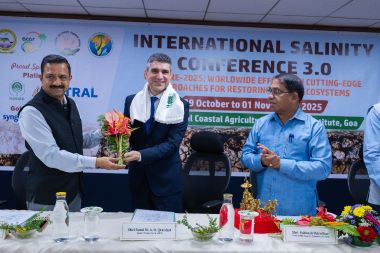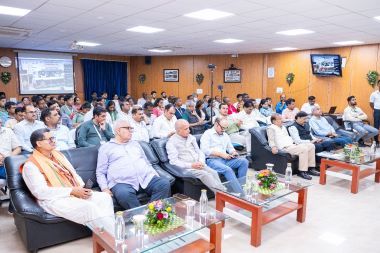1 November 2025, Goa
The International Salinity Conference (WE-CARE-2025) concluded successfully on 31 October 2025 at the ICAR–Central Coastal Agricultural Research Institute, Old Goa. The four-day event, organized jointly by the Indian Society of Soil Salinity and Water Quality (ISSSWQ), Karnal, and the Association for Coastal Agricultural Research, Old Goa, in collaboration with ICAR–Central Soil Salinity Research Institute, Karnal, and ICAR–CCARI, Goa, brought together national and international experts to deliberate on strategies for managing and restoring saline ecosystems.
Shri Subhash Shirodkar, Minister for Water Resources, Cooperation & Institute of Public Assistance (Provedoria), Government of Goa, graced the valedictory session as the Chief Guest. In his address, he emphasized that soil salinity has emerged as a major environmental challenge and urged the scientific community to contribute to the sustainable management and reclamation of saline lands. He also appreciated India’s traditional wisdom and ancient practices in land and water management, which continue to inspire modern sustainable approaches.

Dr. A. Velmurugan, ADG (Soil & Water Management), ICAR, New Delhi, commended the joint efforts of ICAR–CSSRI, Karnal, and ICAR–CCARI, Goa, in successfully organizing the conference. He underlined that such collaborative platforms and knowledge exchanges are crucial for addressing complex natural resource management challenges.
H.E. Mr. Rami Qtaishat, Assistant Secretary General, African-Asian Rural Development Organization (AARDO), highlighted that soil salinity poses a significant threat to food and livelihood security under increasing pressure on land and water resources. He emphasized that integrated policy approaches, technological innovations, and farmer-led initiatives are key to effectively managing salinity and ensuring sustainable agricultural growth.
Dr. Parveen Kumar, Director, ICAR–CCARI, Goa, highlighted several innovative technologies developed by the institute, including salt-tolerant paddy varieties, integrated farming system (IFS) models, improved horticultural crop varieties, a climate-resilient pig breed, and technologies for the revival and sustainable management of Khazan lands. He also elaborated on the institute’s agro-ecotourism model, which promotes livelihood diversification and resilience among coastal farming communities.
Dr. R.K. Yadav, Director, ICAR–CSSRI, Karnal, informed that the conference witnessed participation from 165 delegates representing Asia, America, Australia, Latin America, and other regions. He noted that the event featured six thematic technical sessions and keynote addresses, covering a wide range of issues related to salinity research, mitigation strategies, and climate resilience. Dr. Yadav emphasized that the conference proceedings and recommendations would be shared with policymakers and stakeholders to facilitate upscaling and outscaling of successful interventions.

Dr. A.K. Rai, Head, Soil & Crop Management, ICAR–CSSRI, Karnal, presented the key recommendations emerging from the conference, outlining future directions for research, technology development, and policy formulation.
The conference concluded with the presentation of awards for best oral and poster presentations across various sessions, recognizing outstanding contributions from participating scientists and researchers.
The International Salinity Conference 3.0 served as a global platform for dialogue, collaboration, and innovation, reaffirming the shared commitment toward building resilient and sustainable saline ecosystems worldwide.
(Source: ICAR–Central Coastal Agricultural Research Institute, Goa)







फेसबुक पर लाइक करें
यूट्यूब पर सदस्यता लें
X पर फॉलो करना X
इंस्टाग्राम पर लाइक करें